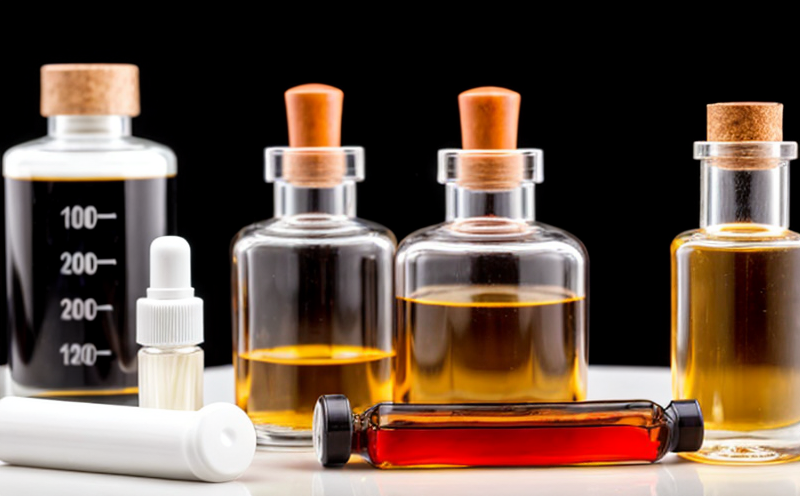Stability Testing of Syrups
In the pharmaceutical industry, the stability testing of syrups is a critical process that ensures product quality and safety. This testing assesses how syrup formulations behave over time under various environmental conditions such as temperature, humidity, light, and shelf life. The aim is to identify any changes in physical properties (e.g., color, viscosity), chemical composition, or microbial content that could affect the efficacy and stability of the medicinal product.
Stability testing plays a pivotal role in regulatory compliance and helps pharmaceutical companies meet stringent standards set by organizations like the United States Pharmacopeial Convention (USP) and the International Conference on Harmonisation (ICH). By conducting these tests, manufacturers can ensure that their syrups maintain consistent quality throughout the shelf life specified on the product label.
The testing process typically involves subjecting syrup samples to controlled environmental conditions over a period of time. This allows researchers to observe any potential degradation or changes in the syrup's properties. The ICH guidelines recommend performing three types of stability studies: accelerated, intermediate, and long-term tests. Each type helps in understanding different aspects of product stability:
- Accelerated Testing: Samples are exposed to higher temperatures (e.g., 40°C) and humidity levels than normal storage conditions. This test aims to accelerate the degradation process to assess how the syrup will perform during its shelf life.
- Intermediate Testing: Samples undergo conditions that fall between accelerated and room temperature exposure, providing insights into the syrup's stability under moderately stressful conditions.
- Long-Term Testing: Samples are kept at normal storage temperatures (approximately 25°C) to simulate real-world storage conditions. This test helps in understanding how the syrup behaves over its entire shelf life.
The results of these tests provide valuable data for quality assurance teams, allowing them to make informed decisions about product labeling and ensure compliance with regulatory requirements. Additionally, stability testing helps manufacturers identify potential issues early on, enabling them to implement corrective actions if necessary before the product reaches the market.
Understanding the chemical composition of syrups is essential for accurate stability testing. Syrups often contain various active ingredients, excipients, and flavoring agents that can interact in complex ways during storage. Analyzing these components through techniques such as High-Performance Liquid Chromatography (HPLC), Fourier Transform Infrared Spectroscopy (FTIR), and gas chromatography ensures that any changes detected are due to the intended chemical reactions rather than contamination or other external factors.
The importance of stability testing cannot be overstated. Not only does it ensure product quality, but it also enhances patient safety by preventing potentially harmful products from reaching the market. By adhering to rigorous testing protocols and using advanced analytical methods, pharmaceutical companies can maintain high standards of product integrity and compliance with international regulatory guidelines.
Why It Matters
The significance of stability testing in the context of syrups cannot be understated. The results of these tests directly impact patient safety and efficacy. For instance, if a syrup formulation begins to degrade faster than expected due to improper storage conditions or formulation issues, it could lead to reduced drug effectiveness or even pose health risks.
From an operational standpoint, stability testing helps pharmaceutical companies manage supply chains more effectively. By identifying potential problems early in the process, manufacturers can optimize production processes and extend shelf life if necessary. This proactive approach reduces waste, minimizes costs associated with recalls, and enhances overall efficiency within the manufacturing cycle.
The regulatory landscape also places stringent requirements on pharmaceutical firms to demonstrate that their products meet specified stability criteria. Non-compliance can result in fines, product withdrawals from the market, or even legal action. Therefore, conducting thorough stability testing is not just a best practice but a necessity for maintaining compliance and ensuring safe and effective medicinal products.
Moreover, consumer trust plays a crucial role in the pharmaceutical sector. Patients rely on the reliability of their medications to provide consistent relief and treatment over time. By investing in robust stability testing programs, manufacturers can build and maintain this trust while also improving brand reputation among healthcare professionals and consumers alike.
Benefits
- Ensures Quality and Safety: Stability testing helps ensure that syrups remain stable throughout their shelf life, maintaining both quality and safety standards.
- Promotes Regulatory Compliance: By adhering to strict testing protocols, pharmaceutical companies can meet regulatory requirements set by bodies like the USP and ICH.
- Enhances Patient Safety: Detecting any potential issues early allows for corrective actions to be taken before products reach the market, ensuring they are safe for consumption.
- Improves Product Integrity: Stability testing helps identify and address any formulation or manufacturing issues that could affect product performance and reliability.
In addition to these direct benefits, stability testing also contributes positively to long-term business sustainability. Companies that invest in comprehensive stability programs tend to experience lower operational costs due to reduced waste and improved production efficiency. Furthermore, maintaining consistent quality through rigorous testing enhances brand reputation and builds lasting relationships with healthcare providers and consumers.
Competitive Advantage and Market Impact
- Innovation and Differentiation: Conducting robust stability tests allows companies to innovate by continuously improving formulations while maintaining high-quality standards. This differentiates them from competitors who may not prioritize this aspect.
- Customer Trust: Demonstrating a commitment to quality through thorough testing builds customer trust, which is essential for brand loyalty and market leadership.
- Avoids Regulatory Issues: Compliance with regulatory standards reduces the risk of recalls or product withdrawals, protecting both companies and consumers from potential harm.
- Improved Efficiency: Early detection of stability issues through testing optimizes production processes, leading to more efficient operations overall.
The impact of robust stability testing extends beyond individual organizations; it contributes positively to the broader pharmaceutical industry by promoting best practices and setting higher standards for product quality. As a result, patients benefit from safer, more effective medications, while healthcare professionals appreciate reliable products that enhance their ability to provide optimal care.





